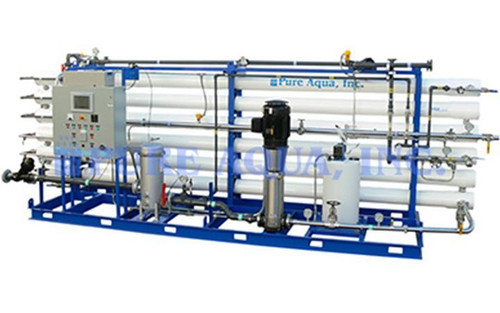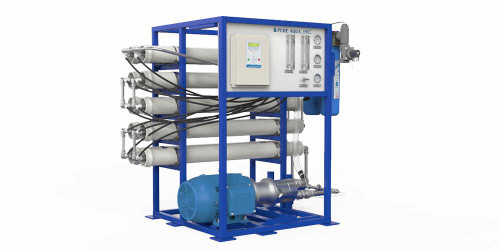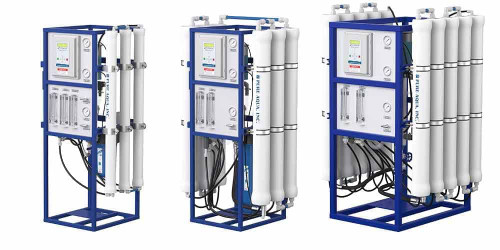A Double Pass Reverse Osmosis (DPRO) System is when the permeate water is fed into a second RO unit to produce more pure water. A two or double stage RO is when the concentrate or reject stream is fed into a second RO system to recover water, respectively. A reverse osmosis system is designed to purify water by rejecting around 99% of total dissolved solids from the feed water. Single Pass RO Systems produce product water (permeate) and reject water (concentrate) at the same time.
[custom-specifications]
How does a Double Pass RO System Work?
Double Pass Reverse Osmosis Systems are composed of two RO systems (1st Pass and 2nd Pass) wherein the 1st pass has a bigger volumetric flow rate capacity than the 2nd pass. In between them, there should be a break tank where either permeate or the concentrate water of the 1st pass RO is stored and fed into the 2nd pass RO for further filtration. Pre-treatment is required to be provided for both the 1st pass and the 2nd pass RO systems if the application will be water recovery, as the quality of the concentrate water on the 1st pass should be bordering on the saturation point. On the other hand, an application might only require a 1st pass pre-treatment if it’s being used as permeate to feed the 2nd pass.
[/custom-specifications]
[custom-features]
Why a Double Pass Reverse Osmosis System?
DPRO, in most cases, is used when there is a specific desired water quality level on the final permeate, as required by the process equipment. It can be a combination of two brackish water RO systems or a sea water RO followed by a brackish water RO system. Some plants are starting to reuse water due to community pressure to minimize the use of either city supplied water or drawing water from raw sources, which dries up the aquifer of their area. These plants use a DPRO to increase water efficiency of their systems. Single Pass RO systems can only recover up to 80% of the feed water by design. Using a DPRO can increase water recovery above 90%.
Many parts of the world are facing droughts and pressure to conserve water. A 2 Pass RO system is able to help by minimizing the reject water generation. Some manufacturing facilities are pushing a little further by applying the Zero Liquid Discharge plan by using a DPRO, Evaporator, or Brine Concentrator to separate the salt from pure water on the final treatment phase, and a Salt Crystallizer at the end.
A Mixed Bed Deionizing (MBDI) system can also be used to polish the permeate water of the Single Pass RO system if the application is just concerned about the water quality. However, due to environmental concerns of hazardous chemicals needed to regenerate a DI units, engineers are specifying to use DPRO if the final water quality will be within the range of their requirement. An Electro Deionization (EDI) system is a complimentary water polishing system to the DPRO should the plant need and ultrapure water for Semi-Conductor or advanced microchip production applications.
[/custom-features]
[custom-usage]
All our brackish water reverse osmosis systems can be ordered in double pass configuration.
[/custom-usage]
-
Double pass RO the definite WTG.
I don't own one of their systems, personally, but I did want to chime in on the effectiveness of 2-pass RO systems to produce ridiculously clean water.
I have a home-built double-pass RO system. Water coming in hovers between 200-230 at the tap, depending on what day it is. So I generally get between 3-7 ppm from the first stage of my double-RO, with 3 being more common than 7 by far. TDS coming from the 2nd stage output of my 2-pass system tests, without fail, at 0 ppm, every single time.
As a side bonus, the first-stage filters need to be changed out every year, but I can go 3 years between filter changes on my 2nd stage, simply because the TDS coming in is so low, they simply don't filter very much.
Very much recommend a 2 pass RO if you're looking for ultra-pure water. The consistent quality and purity is amazing. -
Good customer service
Works well and our team maintains the DPRO system very well too. System came with very detailed manuals that are easy to follow. Great buy.
- Related Project1:
- https://pureaqua.com/ro-edi-water-treatment-systems-10-m3-per-hr-iraq/
- Related Project2:
- https://pureaqua.com/double-pass-ro-system-for-chevron-28800-gpd-usa/
- Related Project3:
- https://pureaqua.com/commercial-reverse-osmosis-tds-reduction-6500-gpd-mexico/
- Related Project4:
- https://pureaqua.com/double-pass-reverse-osmosis-system-dpro/
 ENGLISH arrow_drop_down
ENGLISH arrow_drop_down
 ESPAÑOL
ESPAÑOL ???????
??????? PORTUGUÉS
PORTUGUÉS FRANÇAIS
FRANÇAIS













